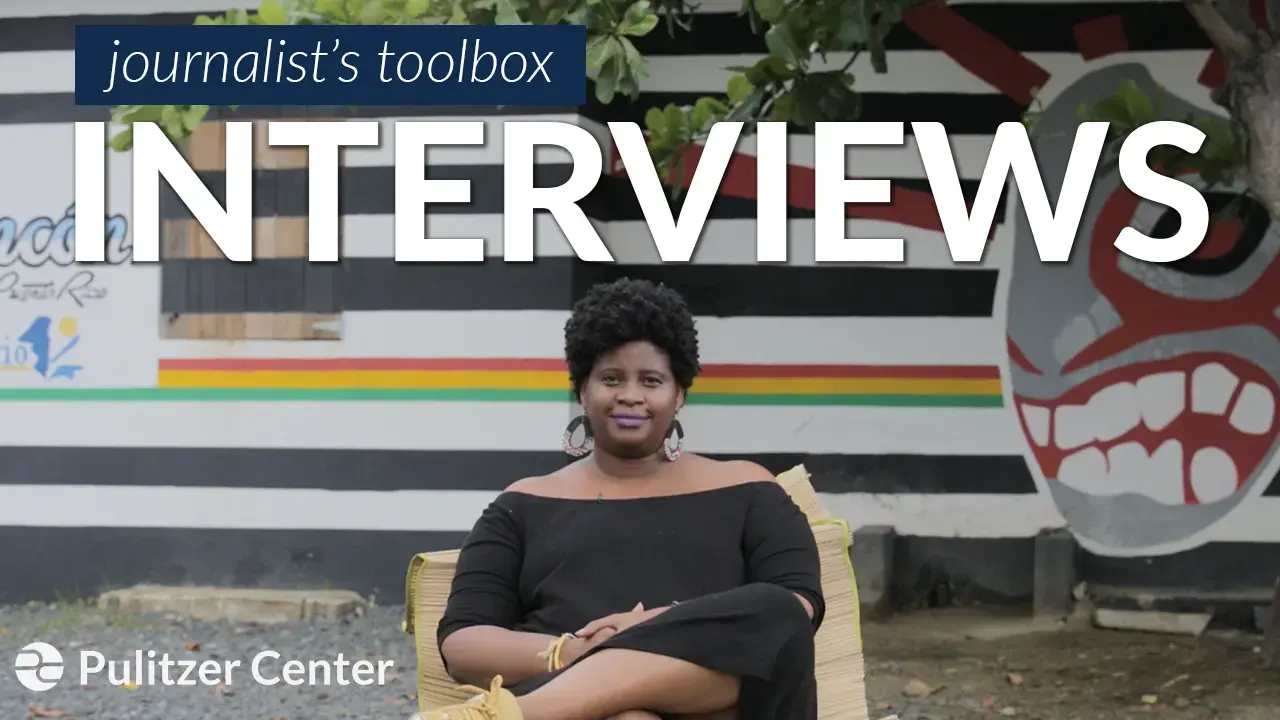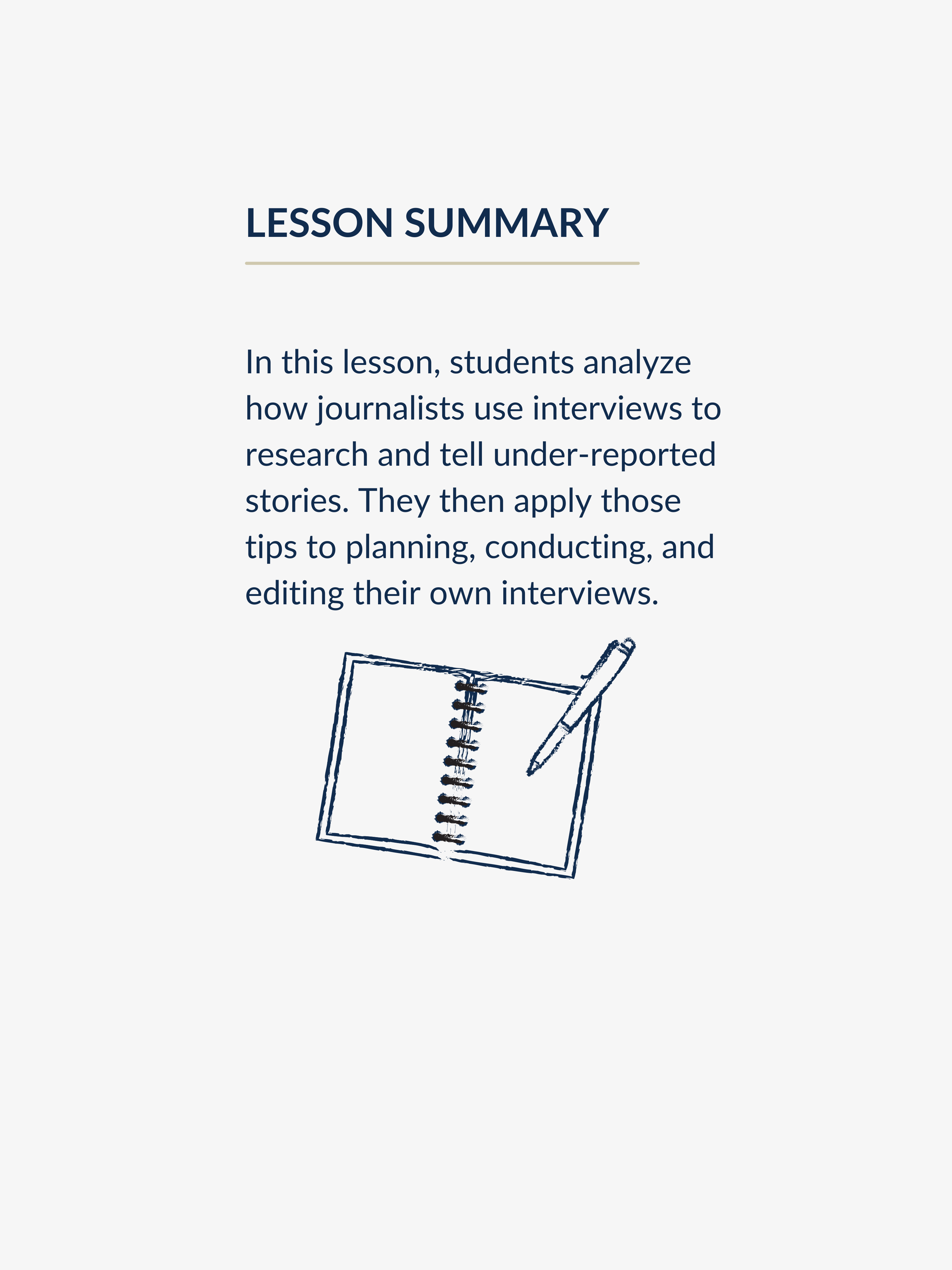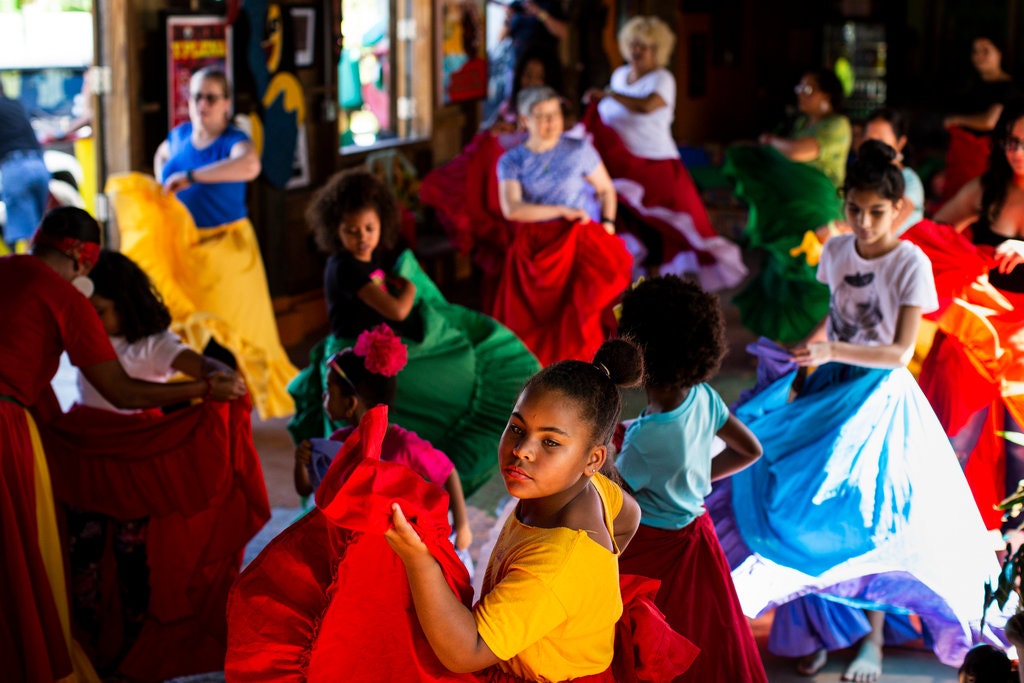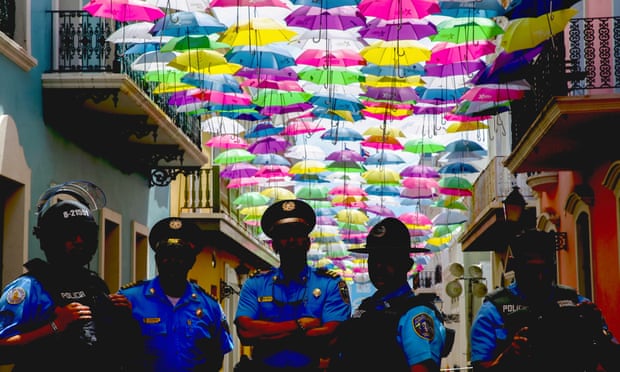Warm-up: Reflecting on the definition of news, what stories we see, what stories go under-reported, and how to seek out those stories.
Interviewing Like a Journalist: Exploring a video about using interviews to research and tell under-reported stories.
Introducing the Lesson: Analyzing how journalist Natasha S. Alford uses interviews in her journalistic writing, and why.
Planning and Conducting Your Own Interview: Putting tips from Natasha S. Alford into practice by planning, conducting, and editing a journalistic interview.
Extension Activities:
1. Analyzing interviews and writing an essay on the role of interviews in journalism.
2. Conducting interviews in order to report a full story on an issue in your community.

Objectives:
After this lesson, students will be able to...
- Evaluate how they get their news, what stories they seek, why news is important, and questions they have about how the news is made
- Define the term "under-reported story," describe examples of under-reported stories, and analyze why these stories are important
- Discuss the role of interviews in journalism, and what kinds of interviews are important to include in a story
- Conduct journalistic interviews in order to tell a story about an issue facing their community
Warm-up:
1. Brainstorm a definition for the word "news." How does your definition compare to the definitions a and b from the Merriam-Webster dictionary?
2. Consider: Which of the following ways do you get most of your news? Newspapers/magazines, TV, Internet/apps, Radio, Other
3. News outlets publish their news using all the different methods above. Make a list:
- Which news outlets (newspapers, tv shows, websites, etc.) do you check to get your news? Compare your answers with this list from the Pew Research Center of the most widely read news websites in 2010!
- What are examples of stories you would see on the news?
4. Imagine you met someone today who has not looked at the news in over a week. Based on what you have heard about in the news over the last week, write your responses to the following on a separate sheet of paper:
- What are the top three things a person needs to know about what is happening in the world this week?
- How did you learn about these issues?
5. Discuss the following on your own, or in a small group:
- What stories do you see the most in the news?
- How might the stories you chose differ from someone else in your class? Or in your family? Or from someone in another part of the world?
- What is something that you think is important, but that you don't see much about in the news?
- Why do you think news outlets choose to feature some stories more than others?
6. An under-reported story is a news story that doesn't get as much attention in the news. Look back to your responses for question 5 and consider the following:
- Why do you think news outlets are focusing on these stories, and not others?
- Why are some news stories receiving less attention? Try to think of at least three reasons.
7. The Pulitzer Center is a nonprofit organization that is dedicated to supporting under-reported stories. The Center supports reporting projects in over 100 news outlets every year on a wide range of topics. Review the video below, which features Pulitzer Center editors and journalists, and compare what they share to your predictions about why some stories receive less attention to their response. After viewing the video, write your response the following on a separate sheet of paper:
- According to the speakers in the video, what is an under-reported story?
- How are under-reported news stories different from other news stories? Reference examples from the video in your description.
- How can you find under-reported stories, in the news and in your own communities?
Introducing the Resource: Interviewing Like a Journalist
One important part of reporting any story is interviewing people. Journalists use interviews to gather and present information, broadening and deepening their understanding of an issue and how it affects people's lives.
How do journalists decide who to interview? How do they prepare for interviews? How do they conduct interviews that get the information they are looking for, while building trust with their subject? Journalist Natasha S. Alford answers these questions and more in the video below. She shares how she used interview techniques to report stories for theGrio, Oprah Magazine, The New York Times, and other publications about racial identity in Puerto Rico and why people choose to identify the way they do on the census.
1. Watch the following video to find out how Natasha uses interviews to tell under-reported stories. Be on the lookout for the following tips that Natasha offers for how to conduct interviews yourself:
- Research and plan questions to prepare for your interview
- Ask open-ended questions
- Take your time
- Listen for quotes that stand out
2. After you have finished watching the video, write down why, in your own words, each of the four tips from Natasha are important to conducting a successful interview. You may want to take notes while you watch!
Introducing the Lesson: Analyzing Interviews
Natasha S. Alford included interviews with nine people in her story for The New York Times and interviews with five people in her story for The Guardian. Each individual contributes a different perspective not only due to their words, but also due to their academic, professional, racial, and cultural backgrounds.
- Choose one of these two stories to read in full. While you read, notice who Natasha chose to interview, and consider why she chose to include each person's voice in the story.
- Use this graphic organizer to track and analyze the interviews in the article.
Practice: Planning and Conducting Your Own Interview
Follow these steps to conduct an interview of your own! Use this graphic organizer to record your progress.
Step 1: Choose an issue you want to focus on
Before you decide who you want to interview, think about what issue you want to explore.
Natasha drew on her personal identity and background to come up with the idea for her story about racial identity in Puerto Rico. What is an under-reported issue in your community that you care about? (Your community might be your neighborhood or town. It might also be any other group with which you identify.) Think about the following questions:
- What is an issue in your community that is an "open secret"—something people may know about, but deserves further investigation?
- What is a big news story in my community right now, and what angle of that story isn't getting as much attention as it should?
Step 2: Identify your interview subject
Now that you have decided what issue you want to explore, think about people who would be great interview subjects for this issue. The subject is the person you are interviewing.
- Make a list of at least three people you would like to interview, and why.
- Choose one of the people on your list and reach out to them!
Tip: When you reach out to a potential interview subject, whether you know them personally or not, make sure you share the following information with them:
- Who you are
- What issue you are exploring
- Why you would like to talk to them specifically about this issue
- How long the interview will take
- Where the interview may appear (Will it be published online? In your school paper? Is it just for your own private research?)
If someone turns down your request for an interview, don't be discouraged. It happens to every journalist! Just move on to another person on your list.
Step 3: Research and plan questions to prepare for your interview
Once someone has agreed to be interviewed by you, it's time to prepare.
- Do some research. You might start by searching for information about the person you are interviewing online. If you can't find much information about them, think: what do you know about them already? For example, if you know they live in a certain neighborhood or teach at a certain school, you could research that neighborhood or school to get more context for your interview.
- Next, make a list of 5-10 questions you plan to ask your subject. What do you want to make sure you come away knowing or exploring?
- Remember to ask open-ended questions (questions that can't be answered with just "yes" or "no") to encourage your subject to talk more.
- Be sure to plan the progression of your questions in advance, too. For example, you might want to start with a broad, easy-to-answer question, and get to more specific or more personal questions later in the interview, once you have built trust with your subject.
Step 4: Conduct the interview
During the interview, be sure to ask the important questions you prepared, but be open and flexible, too. Ask follow-up questions when your subject says something interesting or unexpected. Leave plenty of quiet time in between questions, because your subject might say more. If they don't, use simple prompts like "Can you tell me more about that?" to show your interest. And remember to build trust with your subject, try to set them at ease, and take your time.
Tip: It's important to quote people accurately, but it is hard to write down everything they say. Many journalists record their interviews so they can listen to them later. Consider asking your subject whether they are comfortable being recorded, and if they are, use a phone, computer, or audio recording device during the interview. That way, you can focus on listening, asking follow-up questions, and only jotting down notes when your subject says something that really stands out to you.
Before you end your interview, get a photo of your subject. You may ask them to share a photo with you, or take one yourself. If you are interviewing your subject in person, these photography tips might help. If you don't take the photo yourself, be sure to ask for attribution, or the name of the person who took the photo, so that you can give them credit.
Step 5: Edit your interview
After your interview, you will have much more material than you can publish. To edit your interview, listen to the recording and/or read back through your notes to identify quotes that stand out. Remember Natasha's tip: "Great quotes capture the emotion and humanity of a story." Consider the following: Where in your interview did the subject express excitement, tension, feeling? Try to capture that in the quotes you select.
Finally, assemble an interview excerpt to share! Be sure to include the following elements:
- A 3-5 sentence introduction that explains the issue you chose to explore, and why it is important to hear from the person you interviewed on this issue.
- 3-5 strong quotes from the interview that illustrate the issue you explored with your subject, as well as the personality and feelings that shone through during your conversation.
- A photo of your interview subject.
Extension Activities:
Option 1. Analyzing interviews
- Return to the graphic organizer you used to analyze interviews in Natasha S. Alford's articles. How do other journalists use interviews to research and tell under-reported stories? Apply this graphic organizer to at least two of the following global news stories.
- Then, write a 1-2 page essay that answers the question What role do interviews play in a news story?, using examples from the articles you read.
- The Coronavirus Pipeline: How Tough Policies in the COVID-19 Era Are Endangering Asylum Seekers
- The Many Varieties of Voter Suppression
- The Philippines Is Sending Its Nurses to the Frontline Underprotected
- Kosovo, Home to Many ISIS Recruits, Is Struggling to Stamp Out Its Homegrown Terrorism Problem
- Are Your Tinned Tomatoes Picked by Slave Labor?
- Passports to the American Dream: Mounting Debt, Few Opportunities Keep Guatemalans Coming
- The Ordinary People Keeping the Peace in Nigeria's Deadly Land Feuds
- Sand Mining: The Global Environmental Crisis You've Probably Never Heard Of
- In Person or Online? Homelessness Complicates Back-To-School Dilemma
- Japan Has So Many Vacant Homes It's Giving Them Away
Option 2. Conducting a reporting project
Now that you have a start on your interviewing process, dive deeper. Expand your list of people you could interview on the issue you chose, keeping in mind each person's relationship to the issue and why it is important to hear from them. Conduct interviews with at least three additional people.
Select quotes that stand out from each interview. Then, write an article about the issue you selected that includes these quotes and paraphrased information you learned during your interviews.
Conduct short research projects to answer a question (including a self-generated question), drawing on several sources and generating additional related, focused questions that allow for multiple avenues of exploration.
This lesson is one of a series of lessons called "Journalist's Toolbox" designed to teach media literacy and reporting skills through interactive lessons and instructional videos. To see all lessons in this series, click here. To set up a workshop with a Pulitzer Center education team member, or to connect your class with a journalist, contact [email protected].








